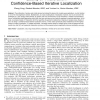Free Online Productivity Tools
i2Speak
i2Symbol
i2OCR
iTex2Img
iWeb2Print
iWeb2Shot
i2Type
iPdf2Split
iPdf2Merge
i2Bopomofo
i2Arabic
i2Style
i2Image
i2PDF
iLatex2Rtf
Sci2ools
110
click to vote
ICDCS
2008
IEEE
2008
IEEE
Quality of Trilateration: Confidence Based Iterative Localization
—The proliferation of wireless and mobile devices has fostered the demand for context-aware applications, in which location is one of the most significant contexts. Multilateration, as a basic building block of localization, however, has not yet overcome the challenges of 1) poor ranging measurements; 2) dynamic and noisy environments; and 3) fluctuations in wireless communications. Hence, multilateration-based approaches often suffer from poor accuracy and can hardly be employed in practical applications. In this study, we propose Quality of Trilateration (QoT) that quantifies the geometric relationship of objects and ranging noises. Based on QoT, we design a confidence-based iterative localization scheme, in which nodes dynamically select trilaterations with the highest quality for location computation. To validate this design, a prototype network based on wireless sensor motes is deployed and the results show that QoT well represents trilateration accuracy, and the proposed scheme...
Basic Building Block | Distributed And Parallel Computing | ICDCS 2008 | Iterative Localization Scheme | Wireless |
Related Content
| Added | 30 May 2010 |
| Updated | 30 May 2010 |
| Type | Conference |
| Year | 2008 |
| Where | ICDCS |
| Authors | Zheng Yang, Yunhao Liu |
Comments (0)

